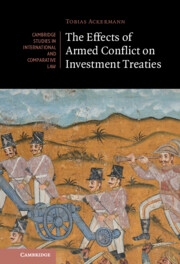Book contents
- The Effects of Armed Conflict on Investment Treaties
- Cambridge Studies in International and Comparative Law: 169
- The Effects of Armed Conflict on Investment Treaties
- Copyright page
- Dedication
- Contents
- Acknowledgements
- Table of Cases
- Table of International Agreements and Documents
- Table of Domestic Instruments and Documents
- Abbreviations
- Introduction
- Part I The Continuity of Investment Treaties
- Part II Investment Protection and the Role of International Humanitarian Law
- Part III Investment Protection Standards during Armed Conflict
- 5 Armed Conflict Clauses
- 6 Full Protection and Security
- 7 Expropriation
- 8 Fair and Equitable Treatment
- Part IV Exceptions and Defences
- Bibliography
- Index
- Cambridge Studies in International and Comparative Law:169
5 - Armed Conflict Clauses
from Part III - Investment Protection Standards during Armed Conflict
Published online by Cambridge University Press: 11 August 2022
- The Effects of Armed Conflict on Investment Treaties
- Cambridge Studies in International and Comparative Law: 169
- The Effects of Armed Conflict on Investment Treaties
- Copyright page
- Dedication
- Contents
- Acknowledgements
- Table of Cases
- Table of International Agreements and Documents
- Table of Domestic Instruments and Documents
- Abbreviations
- Introduction
- Part I The Continuity of Investment Treaties
- Part II Investment Protection and the Role of International Humanitarian Law
- Part III Investment Protection Standards during Armed Conflict
- 5 Armed Conflict Clauses
- 6 Full Protection and Security
- 7 Expropriation
- 8 Fair and Equitable Treatment
- Part IV Exceptions and Defences
- Bibliography
- Index
- Cambridge Studies in International and Comparative Law:169
Summary
Chapter 5 commences the book’s analysis of the operation of the most important investment treaty standards in armed conflict. It focuses on so-called war or armed conflict clauses. These provisions, present in many investment agreements, establish state obligations vis-à-vis investors who have suffered losses during armed conflict and other emergencies. Considering recent arbitral practice in the context of the so-called Arab Spring, the chapter gives guidance on how to understand these understudied clauses, their specific elements as well as their systematic function. While ‘basic’ armed conflict clauses establish a duty of non-discrimination in case the host state compensates other investors for losses suffered, ‘extended’ clauses give a standalone right to claim compensation for certain losses. These clauses convey such a right, among others, in case of requisitioning or unnecessary destruction at the hands of the state’s authorities or armed forces. The chapter shows how the general rules of attribution as well as the rules of international humanitarian law should crucially inform the application of these extended armed conflict clauses.
Keywords
- Type
- Chapter
- Information
- The Effects of Armed Conflict on Investment Treaties , pp. 117 - 145Publisher: Cambridge University PressPrint publication year: 2022

